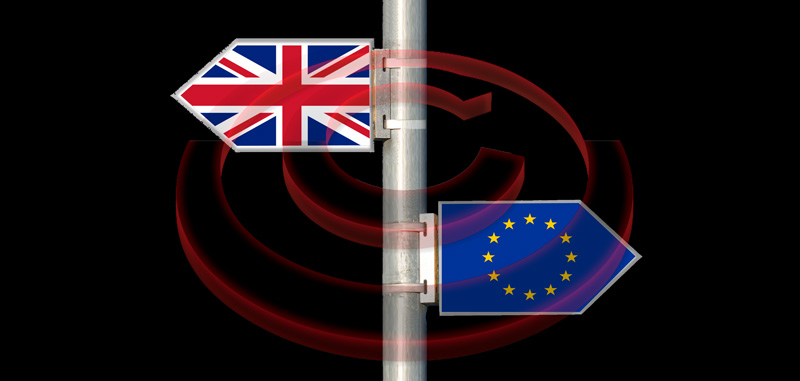
Even with the little which we know about how Brexit will look and how it will happen, we certainly know that apart from the political social and economic environment which will be affected by Brexit, there is serious uncertainty about the future of the law relating to intellectual property (“IP”) rights, particularly European Union-wide registered IP rights – such as the European Union Trade mark, Unitary Patent, the European Union Patent and the Community design.
As the key word when we discuss about Brexit is uncertainty, we believe that Brexit has no immediate consequences on European Union Trademarks (“EUTM”) and on Community designs, as at this moment the legal position and detailed intentions of the UK government are uncertain.
If you are wondering what Brexit will bring in respect of EUTM and Community designs…
As many companies have portfolios of IP rights, which they are keen to protect in the European Union and, of course, in the UK – which is one of the most important territories on Europe’s business map – you can imagine how great is the uncertainty regarding how an EUTM or a Community design will give legal protection in the future.
No IP business will be pleased to have to undertake two registration procedures to protect their trademark over the same territory, respectively the rest of the EU and the UK, instead of a single procedure. When a sole EUTM registration secures rights throughout the entire EU territory (including the UK), things are much simpler.
EU Council Regulation no. 40/94 created a way for an owner of an EUTM to protect its trademarks and gain an exclusive trademark right over the entire territory of the European Union. The unitary character of trademark protection means that an EUTM cannot be valid only in some of the European Union states, but its protection is valid in all European Union states.
For example, a company can register an EUTM in a member state, through a single application to the Intellectual Property Office. The European registration will give the applicant the exclusive right to use the EUTM in the European Union, which allows it to prevent all unauthorised third parties from using the similar or identical trademarks in that territory.
If you are curious and wish to find out what a less happy outcome of Brexit for the EUTM and Community designs might look like – this might be that the EUTM and the Community design would no longer be recognised in the UK. It has been said that after Brexit, the EUTM and the Community design would no longer be protected in the UK. However in reality, the only certainty is that there is uncertainty about what will happen after Brexit happens.
A common sense solution it would be if the UK grants the owners of EUTMs and Community designs the right to register the former EUTM and designs in UK at the national level, where this registration retains the original filing date of the European IP right. Another solution would be to maintain the validity of registered EUTMs and Community designs in the UK, and therefore to develop a mechanism which will allow the conversion of EUTMs and Community designs into national trademarks/designs in the UK.
How will European Patents and Unitary Patents be affected by Brexit?
The European Patent Convention (“EPC”) is a multilateral treaty which establishes the European Patent Office (“EPO”). European patents are granted for some or all of the contracting states to the EPC. They are, or may be, enforceable in Bosnia & Herzegovina, Montenegro, Morocco and the Republic of Moldova as well.
The UK after Brexit might have the same status under this treaty which Switzerland and Turkey have, as both are not EU member states, but have adhered to the EPC. As uncertainty surrounds the relationship between the UK and the European Union after Brexit, it might be possible that the UK will have a similar relationship to the EPC, as Turkey and Switzerland have.
The Unitary Patent on the other hand, does not become a set of national patents which are validated in each Member State where protection is requested, but gives its holder a unique patent protection in all 26 Member States of the EU. It simplifies the process by offering an alternative to patent protection and dispute settlement. Unfortunately the bad news is that the Unitary Patent will probably be affected by Brexit.
Other downsides of Brexit over IP rights
If you are an IP owner seeking to obtain an injunction to protect your rights, you may find yourself forced to introduce separate actions in both an EU member state and also in the UK. After Brexit, you may therefore need to pay more enforcement costs than is the case at present.
What will happen to the description of the EU territory before Brexit, which can usually be found in IP documents such as assignments, licenses, non-disclosure agreements or co-existence agreements? This describes the EU territory as it was composed before Brexit, including the UK.
But as the UK will no longer be a part of the EU after Brexit. To correspond with the geopolitical reality, all such documents concluded before Brexit will probably need to be carefully amended and properly reviewed to ensure that the defined territory covers the remaining EU and the UK.
Another sensitive matter after Brexit will be that EU regulations and directives will no longer automatically apply in the UK. Much will depend upon the final deal reached between the UK Government and the EU, and the extent to which the British legislation which reflects EU legislation is changed.
So what is to be done? This is the question.
The best advice would be to wait and observe further Brexit developments and learn more about the legislative proposal in respect with the existing EUTM and other registered IP community rights.
Also from the strategic point of view, if you have a business interested in protecting trademarks in UK, the advice of the IP professionals would be to consider registering an application at national level in UK, in order to avoid the uncertainties which may come after Brexit.
We have UK legal expertise and will be more than happy to study your case and find the best possible way to protect and maintain the protection of your intellectual and industrial rights in the context of Brexit.





